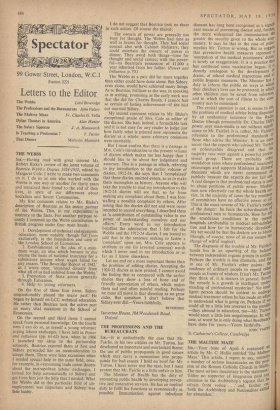Letters to the Editor
The Webbs Lord Beveridge The Professions and the Bureaucrats John Vaizey The Maltese Maze Fr. Charles G. Vella Dylan Thomas in America Alan Hunter The Salary Squeeze J. A. Hunsworth Is Teaching a Profession ? F. Taylor That Dinner Malcolm Monteith THE WEBBS
SIR,—Having read with great interest Mr. Robert Blake's review of the latest volume of Beatrice Webb's Diaries 1924-1932, edited by Margaret Cole, I write to make two comments on it. I do so as one who worked with the Webbs in one way or another for thirty years and remained their friend to the end of their lives, in spite of our differences about Socialism and Soviet Communism.
My first comment relates to Mr. Blake's description of Beatrice as the senior partner of the Webbs. This, in my experience, is contrary to the facts. For another purpoe re- cently I summed up the Webb Contribution to British progress under four main heads : I. Development of technical and economic education, most notably though far from exclusively, in the foundation and care of the London School of Economics.
2. Establishment of the idea of a mini- mum wage, an idea which became in due course the basis of national insurance for a subsistence income when wages failed for any reason. 'The Beveridge Report of 1942,' as I 'wrote once, 'stemmed directly from what all of us had imbibed from the Webbs.'
3. Promotion of State action generally through Fabianism.
4. Help to young reformers.
e On the first of these four items, Sidney unquestionably played the major part. He began by himself on LCC technical education. He rather than Beatrice took the active part on many vital occasions in the School of Economics.
On the second and third items I cannot speak from personal knowledge. On the fourth item I can do so, as myself a young reformer urging labour exchanges. I have told in Power and Influence (pp. 61-62) how, when in 1906 I launched my ideas to the partnership seriously, Beatrice rejected them at first and Sidney persuaded her on reconsideration to accept them. There were later occasions when I needed special help in the same field; once, for example, in overcoming trade union doubts about the metropolitan labour exchanges, 1 turned for help automatically td Sidney and got from him just the help that I needed. What the Webbs did in this particular field of un- employment was important and Sidney was their leader. I do not suggest that Beatrice took no share in such action. Of course she shared The owners of power are generally too busy for thought. The Webbs had time as well as brains for thought. They had social contact also with Cabinet Ministers; they could entertain the owners of power to dinner. They owed both things—time for thought and social contact with the power- ful—to Beatrice's possession of £1,000 a year inherited from her father. (Power and Influence, p. 70.) The Webbs as a pair did far more together than either could have done alone. But Sidney, even alone, would have achieved many things. As to Beatrice, brilliant as she was, in speaking as in writing, promising as the early work was that she did for Charles Booth, I cannot feel so certain of lasting achievement—if she had not married Sidney.
My second comment relates to Mr. Blake's exceptional praise of Mrs. Cole as editor of the diaries. She had, indeed, a formidable task and it is not easy for any reader to judge just how fairly what is printed now represents the diaries as a whole; some arbitrary omissions were inevitable.
But I must confess that there is a passage in Mrs. Cole's introduction to the present volume of diaries which makes me less happy than I should like to be about her judgement and accuracy. This is a passage in which, referring to my introduction to the earlier volume of diaries, 1912-24, she says that I 'complained' that those diaries omitted events, so as to make them incomplete as history. Anyone who will take the trouble to read my introduction to the 1912-24 diaries will see that, so far from making any complaint about them, I was fore- stalling a possible complaint by others. After noting that the diaries did not and were never intended to record everything, I described them as 'a contribution of outstanding value to our power of understanding ourselves and our affairs.' Every word in my introduction breathes• the admiration that I felt for the Webbs and the 1912-24 diaries. I am bound to add that in the sentence seeking to fasten a 'complaint' upon me, Mrs. Cole appears to attribute to me (in inverted commas) words which I never used in my introduction or so far as I know elsewhere.
Let me end on a more important theme than the problem of editing diaries. Accepting the 1924-32 diaries as now printed, I cannot avoid the feeling that as compared with the earlier diaries they show a loss of hope and of friendly appreciation of others, which makes them sad and often painful reading. Perhaps we must all move in that direction as we grow older. But somehow I don't believe that Sidney ever did.—Yours faithfully, sevnatoon Staverton House, 104 Woodstock Road, Oxford


































 Previous page
Previous page